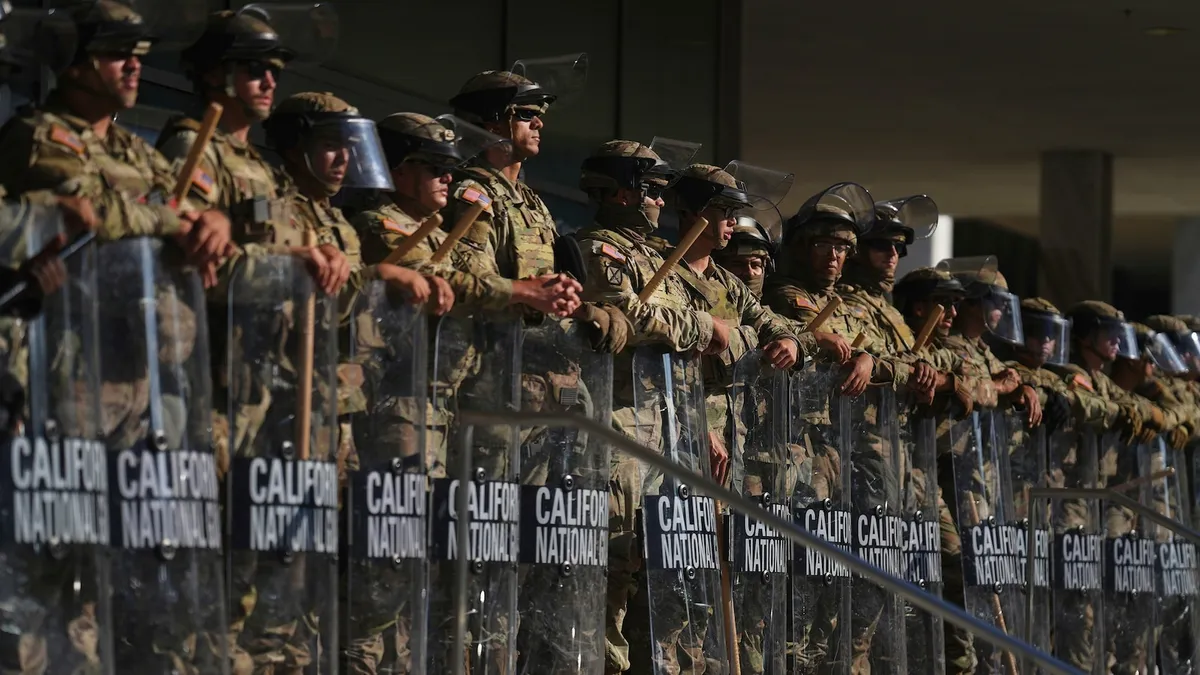
A federal appeals court announced on Thursday that it would delay an order requiring the Trump administration to return control of the California National Guard to Governor Gavin Newsom. A panel consisting of three judges from the Ninth Circuit Court of Appeals issued an administrative stay on the lower court's order and scheduled a hearing for June 17. Notably, two judges on this panel were nominated by former President Donald Trump, while one was nominated by President Joe Biden.
Earlier on the same day, a federal judge in California issued a temporary restraining order that aimed to block Trump's decision to deploy California National Guard troops during protests related to immigration raids in Los Angeles. This ruling sought to return control of the National Guard to Governor Newsom. The judge's order was described by Trump's lawyers as unprecedented and an extraordinary intrusion on the President's constitutional authority as Commander in Chief.
Following the issuance of the restraining order, the Trump administration quickly filed an emergency motion with the Ninth Circuit Court of Appeals, calling the lower court's ruling an overreach. The restraining order, which did not limit Trump's use of the Marines, was set to take effect at noon on Friday before being paused by the appeals court.
U.S. District Judge Charles Breyer ruled that Trump did not adhere to the congressionally mandated procedure for deploying the National Guard. Breyer stated that Trump's actions exceeded his statutory authority and violated the Tenth Amendment of the United States Constitution, necessitating the return of control of the California National Guard to the state's Governor immediately.
In a subsequent press conference, Governor Newsom expressed his satisfaction with the judge's ruling, indicating that he would restore the National Guard's previous responsibilities. He emphasized that the National Guard would return to critical tasks such as border security, counter-drug enforcement, and wildfire management, which had been disrupted by Trump's deployment.
Governor Newsom, along with Attorney General Rob Bonta, had filed an emergency request earlier in the week to block what they labeled as Trump's unnecessary and unlawful militarization of California. This request was made following Trump's memorandum that deployed over 2,000 National Guard troops to Los Angeles amid ongoing protests, which Newsom and other state officials contended were unwarranted.
In his order, Judge Breyer underscored the importance of protecting the First Amendment rights of protesters, asserting that isolated incidents of misconduct do not negate the rights of the collective. He pointed out that the protests in Los Angeles did not meet the legal criteria for a rebellion, which must be armed, violent, organized, and aimed at overturning the government.
Judge Breyer expressed concerns that the continued militarization of Los Angeles could exacerbate tensions and lead to increased hostilities and potential loss of life. He noted that the deployment deprived California of thousands of National Guard members needed for essential functions, including fighting fires and combating the fentanyl epidemic.
In total, approximately 4,000 National Guardsmen and 700 Marines had been ordered to the Los Angeles area following protests related to immigration enforcement. Trump justified the deployment by invoking Section 12406 of Title 10 of the U.S. Code, which allows for federal troops to be deployed in response to a rebellion or threat against the federal government.
During a hearing earlier on Thursday, Breyer discussed whether the President complied with the Title 10 statute and if the National Guard was properly federalized. The federal government argued that Trump acted within his legal rights, while California's legal representatives contended that the President's actions represented an overreach of federal executive power.
Attorney General Bonta articulated that there was no invasion or rebellion occurring in Los Angeles; instead, he described the situation as civil unrest manageable by local authorities. He also cautioned that the President's actions set a troubling precedent for future military involvement in domestic affairs.
In defense of his decision, Trump stated that the situation in Los Angeles was "out of control" and emphasized his desire for safety. He claimed that the police were unable to manage the protests effectively and suggested that his actions were necessary to prevent similar unrest in other cities across the country.
As the legal battle continues, both sides await the scheduled hearing on June 17, where further arguments will be presented regarding the legality of the President's deployment of the National Guard.